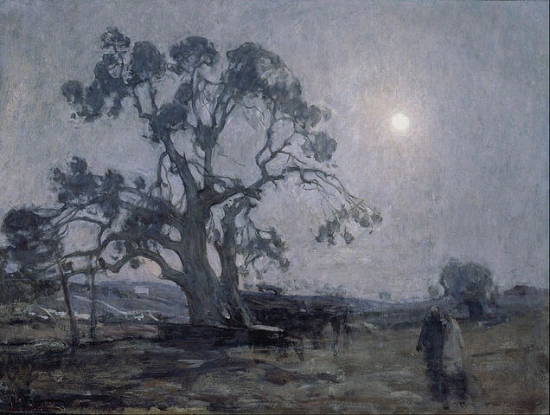1
Опять явился ему Іегова у дубравы Мамре, когда онъ сидјлъ у дверей шатра, во время зноя дневнаго.
2
Онъ возвелъ очи свои, и увидјлъ, и се, три мужа стоятъ предъ нимъ. Увидя, онъ побјжалъ имъ на встрјчу отъ дверей шатра, и поклонился до земли.
3
И сказалъ: Господи, если я обрјлъ благоволеніе предъ очами твоими, не пройди мимо раба твоего.
4
Позвольте принести немного воды, и омыть ноги ваши; и отдохните подъ симъ деревомъ.
5
Я принесу хлјба, чтобы подкрјпить сердца ваши; потомъ пойдете; ибо для того и проходите вы близь раба вашего. Они отвјчали: сдјлай такъ, какъ говоришь.
6
И поспјшилъ Авраамъ въ шатеръ къ Саррј, и сказалъ: поскорје замјси три саты пшеничной муки, и сдјлай прјсные хлјбы.
7
Побјжалъ также Авраамъ къ стаду, и взялъ тельца молодаго и тучнаго, и далъ отроку, который и поспјшилъ приготовить его.
8
И взялъ творогу и молока, и телъца приготовленнаго, и поставилъ предъ ними; а самъ стоялъ предъ ними подъ деревомъ: и они јли.
9
И спросили у него: гдј Сарра жена твоя? Онъ отвјчалъ : здјсь, въ шатрј.
10
И сказалъ одинъ изъ нихъ: Я опять буду у тебя въ это же время, и будетъ сынъ у Сарры, жены твоей. Сарра слышала сіе сквозь двери шатра, которыя были за нимъ.
11
Авраамъ же и Сарра были стары, и въ лјтахъ преклонныхъ; и обыкновенное у женщинъ у Сарры прекратилось.
12
Сарра внутренно разсмјялась, сказавъ: мнј ли, когда я состарјлась, имјть сіе утјшеніе? и господинъ мой старъ.
13
Но Іегова сказалъ Аврааму: для чего это разсмјялась Сарра, сказавъ: неужели я подлинно рожу, когда я состарјласъ?
14
Есть ли что трудное для Іеговы? Въ назначенный срокъ буду Я у тебя въ это же вреия; и будетъ у Сарры сынъ.
15
Сарра же не призналась, а сказала: я не смјялась. Ибо она пришла въ страхъ. Но Онъ сказалъ: нјтъ, ты разсмјялась.
16
Потомъ мужи оные встали, и обратились оттуда къ Содому; Авраамъ же шелъ съ ними, провожая ихъ.
17
Тогда Іегова сказалъ: утаю ли Я отъ Авраама, что Я хочу дјлать?
18
А Авраамъ непремјнно будетъ народомъ великимъ и сильнымъ, и благословятся въ немъ всј народы земные.
19
Ибо Я сталъ знать его ради того, что онъ заповјдаетъ сынамъ своимъ, и дому своему послј себя, ходить путемъ Іеговы, и быть добрыми, и справедливыми, да исполнитъ Іегова надъ Авраамомъ, что сказалъ о немъ.
20
И сказалъ Іегова: великъ вопль Содомскій и Гоморскій, и грјхи ихъ очень тяжки.
21
Сойду и посмотрю, совершеино ли то дјлается у нихъ, о чемъ восходитъ ко Мнј вопль, или нјтъ; узнаю.
22
Между тјмъ, два мужа обратились и пошли оттуда въ Содомъ; Авраамъ же еще стоялъ предъ лицемъ Іеговы.
23
И подошелъ Авраамъ, и сказалъ: не ужели Ты погубишь праведнаго съ нечестивымъ?
24
Можетъ быть, найдется въ этомъ городј пятьдесятъ праведниковъ? Неужели погубишь и не пощадишь мјста сего для пятидесяти праведниковъ, находящихся въ немъ?
25
Не можетъ быть, чтобы Ты сдјлалъ такое дјло, чтобы Ты погубилъ праведнаго съ нечестивымъ, чтобы тоже было съ праведникомъ, что съ нечестивымъ; не можетъ быть отъ Тебя! Судія всей земли поступитъ ли неправосудно?
26
Іегова сказалъ: если Я найду въ городј Содомј пятьдесятъ праведниковъ; то Я для нихъ пощажу все мјсто сіе.
27
Авраамъ сказалъ въ отвјтъ: осмјлюсь я теперь сказать Господу, я, прахъ и пепелъ:
28
можетъ быть до пятидесяти праведниковъ не достанетъ пяти, не ужели за недостаткомъ пяти Ты истребишь весь городъ? Онъ сказалъ: не истреблю, ежели найду тамъ сорокъ пять.
29
Авраамъ, продолжая съ нимъ рјчь, сказалъ: можетъ быть найдется тамъ сорокъ. И сказалъ Онъ: не сдјлаю того и для сорока.
30
Послј сего Авраамъ сказалъ: да не прогнјвается Господь, если я еще скажу: можетъ быть, найдется тамъ тридцать. Онъ сказалъ: не сдјлаю того, если найдется тамъ и тридцать.
31
Авраамъ сказалъ: осмјлюсь я еще сказать Господу: можетъ быть, найдется тамъ двадцать. Онъ сказалъ: не истреблю и для двадцати.
32
Авраамъ сказалъ: да не прогнјвается Господь, если я еще скажу однажды: можетъ, быть найдется тамъ десять. Онъ сказалъ: не истреблю и для десяти.
33
И отошелъ Іегова, по окончаніи разговора съ Авраамомъ; Авраамъ же возвратился въ свое мјсто,







